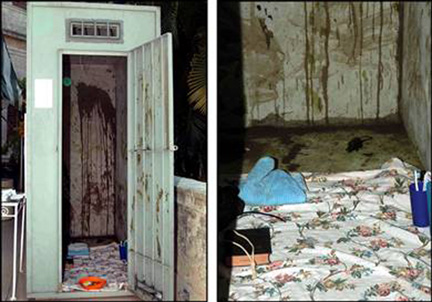|
Home
|
Cuba - The Repression Goes On A Czech journalist supports the Cuban people In the Spring of 2003 fidel castro locked up 75 Cubans. They were not guilty of what would be considered crimes in civilized countries - some were accused of what the free world considers political dissent, and others simply committed journalism. They were given draconian sentences. International outrage was huge for a short while. Even the EU protested and imposed sanctions. But, as usual, fidel thought he could rely on his best friend - International indifference. After a year and a half, it was back to business as usual. Dr. Oscar Elias Biscet is an example of one of these prisoners. He is a follower of Dr. Martin Luther King, Ghandi, and the Daili Lama. His crime was holding meetings to discuss the lack of human rights in Cuba. His sentence was twenty-five years. His cell is a box - a replica is below (photo courtesy The Real Cuba.) Wves, mothers and sisters of the detained men decided to fight back against indifference.They march and pray regularly asking for justice. They are just as regularly harassed and threatened by castro's thugs. These brave women are known as The Ladies In White (Las Damas de Blanco), and late last year they were awarded the Sakharov prize by the EU. Of course, they were not allowed to leave Cuba to pick up the award. Even the Wall Street Journal noticed that. Some in former communist countries, such as the Czech Republic understand and stand on the side of freedom for the Cuban people. The Czech diplomats assigned to Cuba have been helping people committed to a free and democratic country. fidel can't allow that and has expelled Czech diplomats. The Czech Business Weekly responds. Cuba is in a state of political war with the Czech Republic. One Havana-based Czech diplomat hasn’t had his visa renewed; Prague for its part has done the same for one Cuban diplomat here while Czech Foreign Minister Cyril Svoboda has done some tough talking in the run-up to the meeting of the EU Council of foreign ministers: Fidel Castro, so says Svoboda, must be punished. There’s been a lot of cheering in the Czech media for the minister, and there’s certainly something to be said for Mr. Svoboda – or, to be more accurate, for Czech diplomats on the “Island of Freedom.” For some years now they have been trying to help the Cuban anti-communist opposition. The Czech nongovernmental organization People in Need was more helpful still, certainly in practical terms, having sent equipment and money and having even set up an international pressure group chaired by former President Václav Havel. The group has loudly campaigned for the release of Cuban dissidents. On top of all of this is meant to be Czech diplomacy, with its adamant stance against Fidel Castro. We have somehow taken the role of the brave few who have the courage to be publicly against the ageing revolutionary. A very good thing in itself. One certainly doesn't find such courage among U.S. businesses nor among state govenrnments. Over the past year, we've seen delegations from Louisiana, North Dakota, Nebraska, Maine, and Vermont travel to Cuba and make deals with Cuba's dictator. As a result, despite castro screaming about a blockade, the United States is the number one supplier of food to Cuba. Unfortunately, the governors and other state officials have wholly failed to negotiate any freedom for the Cuban people.
And whishy-washiness exists even in the Czech Republic. When the EU resumed relations with Cuba, Mr. Svoboda refused to use his veto. He said that he would give castro a six-month appraisal. At the end of six-months, he did nothing. That has at least one Czech journalist asking questions. But it’s very clear why the foreign minister behaves this way. He’s the leader of the Christian Democrats (KDU-ČSL) in Prague, a rather rural party in the metropolis. He desperately needs some liberal and modern-looking issues. That is also why he became such an enthusiastic supporter of an ever-closer Europe and everything European. (He probably even means it and genuinely believes that Europe is the future.) But this sort of thinking has led him into a trap. What if two supposedly progressive ideas clash with each other? He should and could have vetoed the appeasement of Castro in 2005, but made no use of the one-off opportunity because to such a Europeanist it simply seemed inappropriate to block a majority decision. As long as Spain, France and, say, Britain don’t change their minds, Svoboda will have his hands tied in Brussels. So the Czech politicians and chattering classes remind one of the final scenes in Miloš Forman’s movie Hoří, má panenko (The Firemen’s Ball). An old man who has just had his house burned down desperately needs money; people at the firemen’s ball hand him their tickets for the raffle. The old man stands on the stage and possibly realizes that he can’t expect any real help from them. But the people don’t notice. They are to busy applauding themselves for their generosity. And the governments in the various states listed above are applauding themselves for the great deals they have made for the farmers and food processors in their states. They are expecting the people of the state to hand them their raffle tickets at the next election. They would be better served to pay attention to the Cuba Archive Project - an attempt to document each death caused by fidel's revolution - from the people killed by firing squads led by che guevarra, to the people who died at the hands of thugs in the streets, to the people who died in prison, to the people who died in the Florida Straits trying to escape. The count is now exceeds 31,000 and grows daily. Don't let Dr. Biscet join this number. |
